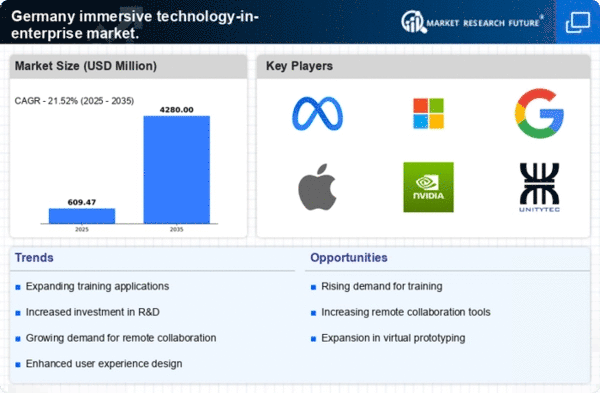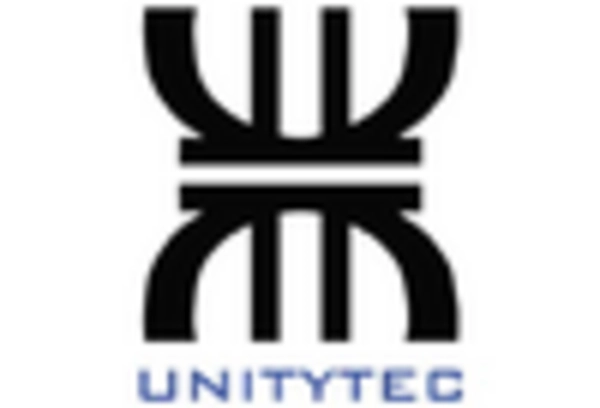Supportive Government Initiatives
The German government is actively promoting the adoption of innovative technologies, including those within the immersive technology-in-enterprise market. Various initiatives and funding programs are being introduced to encourage businesses to invest in digital transformation. For example, the government has allocated substantial financial resources to support research and development in immersive technologies. This support is expected to foster innovation and drive the integration of immersive solutions across various industries. As companies leverage these initiatives, the immersive technology-in-enterprise market is likely to witness accelerated growth, positioning Germany as a leader in this technological domain.
Advancements in Hardware and Software
Technological advancements in hardware and software are playing a pivotal role in shaping the immersive technology-in-enterprise market. In Germany, the development of more powerful and affordable devices, such as VR headsets and AR glasses, is making immersive solutions more accessible to businesses of all sizes. Furthermore, software innovations that enhance user experience and integration capabilities are also emerging. For instance, the introduction of cloud-based platforms allows for seamless collaboration and data sharing among teams. As these technologies continue to evolve, they are likely to attract more enterprises to adopt immersive solutions, thereby propelling growth in the market.
Rising Demand for Virtual Prototyping
The immersive technology-in-enterprise market is experiencing a notable surge in demand for virtual prototyping solutions. Companies in Germany are increasingly adopting these technologies to streamline product development processes. By utilizing virtual prototypes, organizations can reduce time-to-market and minimize costs associated with physical prototypes. According to recent data, the adoption of virtual prototyping has led to a reduction in development costs by up to 30%. This trend is particularly evident in the automotive and manufacturing sectors, where rapid iterations and testing are crucial. As businesses seek to enhance their competitive edge, the integration of immersive technologies into prototyping is likely to become a standard practice, thereby driving growth in the immersive technology-in-enterprise market.
Increased Focus on Employee Engagement
Employee engagement is becoming a critical focus for organizations in Germany, leading to a growing interest in immersive technology-in-enterprise market solutions. Companies are recognizing that immersive experiences can significantly enhance training and onboarding processes, resulting in higher employee satisfaction and retention rates. Research indicates that organizations utilizing immersive training solutions report a 40% increase in employee engagement levels. This trend is particularly relevant in sectors such as retail and hospitality, where customer interaction skills are paramount. By investing in immersive technologies, businesses aim to create a more engaging work environment, which in turn is expected to drive the demand for immersive solutions in the enterprise sector.
Growing Importance of Data Visualization
Data visualization is increasingly recognized as a vital component in decision-making processes, leading to a heightened interest in immersive technology-in-enterprise market solutions. In Germany, businesses are leveraging immersive technologies to create interactive data visualizations that enhance understanding and engagement. This trend is particularly significant in sectors such as finance and healthcare, where complex data sets require clear representation. Studies suggest that immersive data visualization can improve information retention by up to 70%. As organizations strive to make data-driven decisions, the demand for immersive solutions that facilitate effective data visualization is expected to grow, further propelling the immersive technology-in-enterprise market.

















